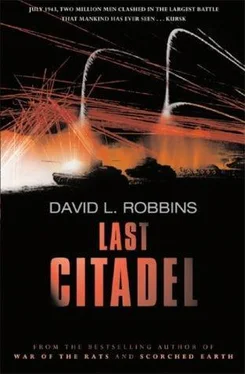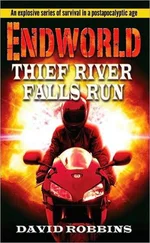He leaped out, shouting Toro, beh! Toro, beh! He held his two banderillas , barbed sticks wrapped in ribbon, close over his head as though they were his own horns. He mimicked the bull’s pawing foot with his boot, raising dust and wild clapping in the hot, brimming arena. He took his eyes from the bull and glanced into the stadium, the crowd knew he was the son of Ramon. He’d practiced this move on leather bulls for five years, pushcarts in his father’s hands. Finally, this was no barrow with strapped-on horns but a toro charging. Luis waited, waited, he felt nothing but the barbs in his raised hands; the toro bore down and Luis held motionless. Then he began to run at the bull, at the lowered horns, not dropping his hands and the banderillas . Close enough to see into the eyes of the toro – they were black and blank with stupidity and rage – Luis vaulted aside, nimble as wind, and drove the sticks into the crimson gash opened by the picador . The barbs bit deep, the ribbons unraveled and fluttered and the bull thundered past. Luis thrust his empty hands in the air and galloped away under a canopy of applause. Blood spattered the silver trousers of his traje de luces , his suit of lights.
Once the bull was stuck more times by the other banderillas , the trumpet sounded again, and Luis retired to the wall to watch his father; for the first time Luis wore the silver while his father wore the gold. Out Ramon came for the faena , the last part of the bullfight, to music and shouts, and he butchered the bull. It was the worst performance Luis had ever seen from his father. Ramon de Vega was renowned across Spain for the grace of his maneuvers with the muleta , his nearness to the horns, the blood he swiped from the bull onto himself. The cape of Ramon was the passing of the veil of God for the bull, a daring and honorable final act. The trincberazo , with one knee on the ground. The pasa de la firma , where the matador stands in one place and runs the bull around him in a dangerous circle. The manoletina , holding the muleta behind the body. And the natural , where the sword, the estoque , is removed from behind the cape to make the cloth a smaller target, tempting the bull to charge at the largest thing it sees in its fury, the matador . Luis watched his father hesitate in all these, Ramon failed to engage fully and the bull lost its fury. His father’s passes were mechanical, not the flow of the blood and heat that was Spain and the fame of Ramon de Vega. The bull stopped and the father was left with nothing, the unsure crowd sat on its hands. Ramon dropped the muleta , pointed the sword, and waited. The bull glowered at him, exhausted and dumb. Ramon ran at the bull. The animal was done with it and stood detached. Ramon rose and drove the estoque between the shoulder blades and the bull stumbled at the pain but did not fall; the blade had missed the aorta. This was a disgrace for a matador . The art of the bullring was to live dangerously with the bull, then to reward it with a swift and beautiful death. Boos from the cheap seats in the sun hurtled down like thrown trash and Luis ran into the ring, unsheathing his knife. He approached the bull quickly. He measured the place at the base of the bull’s skull, in front of the golden hilt of the estoque wobbling, useless, and plunged his short broad blade as hard as he could to sever the spinal column there. He was sixteen years old and weeping for his father. The bull buckled and fell. Luis left the ring, the bull’s blood sticky in his fist. He found his father inside the toril , beside the pen in a corner. The man’s golden suit of lights would not go dim, even in the shadows of the pen. Luis held out the knife and his stained hand and said to him, ‘Father.’
The man’s eyes were as red as the blood on Luis’s dagger.
‘Father, a de Vega killed the bull. It doesn’t matter.’
‘I’m ashamed you saw that. I wanted it to be the best bull, for your first day in the corrida .’
‘Then it was the best bull. Because you wanted it to be. Thank you.’
His father looked at the knife. He sniffled and smiled at once, a wonderful maneuver.
‘You were fearless out there,’ Ramon told his son.
‘Because,’ Luis said, ‘you wanted me to be.’
An hour later, Ramon de Vega engaged his second bull, the final and the greatest of the six in that day’s corrida , and he was magnificent. He won the crowd again and was awarded two severed ears from the wonderfully dead bull. Circling the ring, Ramon held up the ears to the roaring crowd. Luis walked behind him gathering off the ruffled dirt the tossed roses, wineskins, hats, cigars, and ladies’ fans.
The year was 1934. Luis intensified his apprenticeship under his father, learning all the passes, and perfecting his courage as a banderillero . He would become the next generation of great matadors in the de Vega lineage. One day he came home and told his father his friends had come up with a nickname for him, The Dagger.
But around him, boiling about his family and the bullrings, across Barcelona and all of Spain, was civil unrest. The elected Republican government had for several years begun to unravel the ancient influences of the Church in Spain. Luis’s father despised the Republicans as socialists and middle-class reformers, handmaidens of the Communists. Ramon told Luis many times the government wanted to sweep away old Spain, a society built on Catholicism, monarchy, and the military, buttressed by birthright and honor. The Republicans wanted to reform the country into a little model of Russia, where there was fake equality among men, all were laborers, there were no peasants, no noblemen, and there was no God for anyone.
In Barcelona, a Republican bastion in Catalonia, Luis watched the violence grow. Priests were murdered – he saw a mob force a priest to lie on the ground with his arms spread in the shape of the cross before they chopped his arms off – nuns violated, and churches desecrated. Brawls spilled into the streets, it was the old and the new come to blows. Labor groups became vigilantes in what was known as the Red Terror, they rounded up suspected opponents and held midnight courts and dawn executions. Luis was kept away from the fights and the virulent politics by his father. But revolution was brewing. Even practicing his passes with the muleta and his thrusts with the dagger and the estoque , Luis saw the revolt coming.
In 1936, the Republican Catalonian governor shut down the bullrings, claiming the events were anti-Socialist. The energies of the people would be better spent building the new Spanish culture, not hewing to old, violent traditions. Ramon de Vega saw no hope for peace; a delirium was in Spain and it had to be thrashed out between the Soviet-backed Republicans and the unyielding supporters of old Spain, the Nationalists. He sent his son away from the bulls, into the Nationalist army, to serve in Spanish Morocco under his old friend, General Francisco Franco.
Within four months, the uprising in Spain erupted. Franco needed his army to come quickly from Morocco, and he got the help he needed from the German Führer Hitler. Luis boarded a German airplane with the rest of Franco’s loyal army and headed over the Straits of Gibraltar for the mainland.
For the next three years, Luis Ruiz de Vega fought in the armored division. His tanks were supplied by the Nazis and the Italians. They were all lightly protected, creaky playthings and pitifully gunned. Mussolini sent his CV-35, Hitler his Panzer Mark Is. Neither could withstand a direct hit from the smallest antitank guns of the Republicans, and neither stood a chance against the fast Russian T-26s with their 45 mm guns. Luis learned to be sly in his tanks, to come from the flank and behind, to dodge the horns of the enemy, always relying on speed and cunning more than strength. He earned promotions to squad and platoon leader, then company commander, leading as many as a dozen tanks into battle.
Читать дальше












